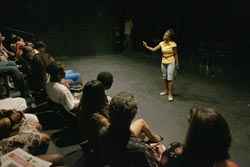Temple Writing Academy exposes teens to creative writing
| An audience of high school students fell silent as H. Bernard Hall, assistant director of the Temple Writing Academy, pulled a small notebook from his knapsack and began to recite an original piece of poetry.
Using well-crafted phrases and imagery, Hall quickly delivered a rhythmic verse on what poetry means to him: “What Grannys’ do in the kitchen after church on Sundays, / Makin somethin out of nothin…/Cornrolls, chitterlins and grits/ Two turntables and a m c / Piece of cardboard, space and opportunity/ What my mama and daddy did to make me/ Now that’s poetry!” “That was hot,” poetry student Raquisha Lambright whispered to a classmate as several fingers snapped in a show of approval. |
 Photo by Joseph V. Labolito/Temple University
Students from several local high schools participated in a poetry reading during the Temple Writing Academy's closing celebration.
|
|
No, Hall and his students were not on a class trip to a trendy poetry café. Instead, they were situated in a small classroom in the Tuttleman Learning Center where Hall, a doctoral student in urban education, led the Temple Writing Academy’s weekly summer class on performance poetry. “There is a deficiency in the teaching of writing in many schools,” Hall said. “All too often, music, creative writing, dance and the other arts are the first to be cut from a school’s budget. “This program helps students realize that art does matter; it can be a way of life, and the skills can be used to further their education,” he continued. More than 60 students from several local high schools participated in the four-week program to improve their creative and academic writing skills through classes on hip-hop journalism, performance poetry, blogging, playwriting, autobiography and fiction. In their class on blogging, students created an online community complete with colorful journal pages while learning the importance of writing for an audience — a skill that is often overlooked in academic settings, said instructor and graduate student Jessica Lewis-Turner. “There are people from all over the world reading these blogs and giving our students feedback,” she said. “Students are being exposed to the web and the dynamics of an online community where tailoring your message to a specific audience becomes important.” Throughout the program, students worked closely with instructors who led them through the writing process and helped bridge the gaps between personal writing and academic writing. “The goal here is to help students understand what it means to read and write critically and apply that to situations and dreams in their own lives,” said Eli Goldblatt, English professor and director of New City Writing: Institute for Literacy and Culture. Goldblatt served as the program’s faculty advisor. The Wiesenecks made a commitment of $79,850 to support the first year of the program and will likely fund the academy next year. “These students are already amazing writers,” said Jennifer Maloy, program director and composition assistant for Temple’s First-Year Writing Program, which is housed in the English Department. “The academy gives them a space to really grow and explore the possibilities of what their talent can become.” |
|